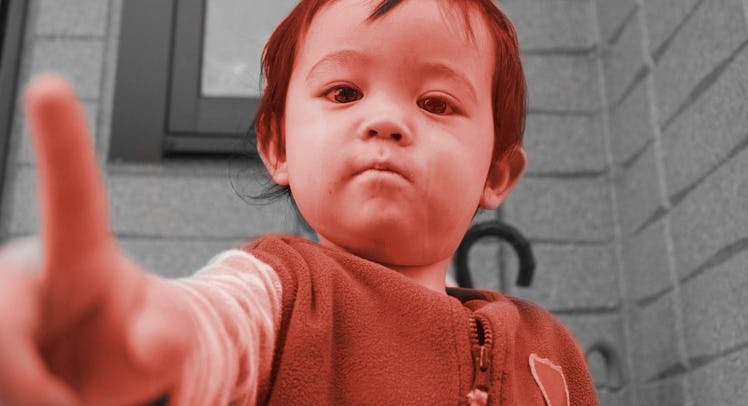Turning a Bossy Toddler into an Assertive Playmate
Toddlers, like jerks, want to own everything, from toys, to attention, to space. Viewing everyone as a potential threat leads to a lot of outrageous demands.

Toddlers, like teens, go through a natural phase of pushing their boundaries and asserting their burgeoning sense of identity. As this happens, it can seem like they’re being bossy – hell, they are – but behaving like the dumbest guy in a board meeting is a valuable part of figuring out the world, which is hard on kids who don’t figure out how to be assertive. A parent’s goal shouldn’t be to quash this sense of independence, but to encourage the toddler’s fighting spirit without encouraging obnoxious behaviors likely to do social damage down the line.
“Kids can have a range of personalities, but some expected behaviors of toddlers need to be managed,” says Dr. William Stratbucker, a pediatrician at Helen DeVos Children’s Hospital in Grand Rapids and Fellow of the American Academy Pediatrics. “If you’re faced with a toddler personality where you’re trying to work with them in interacting with other toddlers, you can help that situation with practice. One of the probably most important parts of that is to normalize sharing.”
Toddlers, like jerks, want to own everything, from toys, to attention, to space. Viewing everyone as a potential threat leads to a lot of outrageous demands. Structured scenarios can help kids grow comfortable with sharing and help them see there’s no need to be paranoid. Maybe a meal time includes a shared bowl of fruit. It’s not the toddler’s fruit. It’s everyone’s fruit, but the toddler still gets enough to be satiated and sees older family members modeling the behavior parents want to promote.
Supervised play in a safe place with a sibling, cousin or familiar friend gives a toddler opportunities to stretch those sharing muscles. Perhaps some “non-shareables” are negotiated beforehand, so they can retain a sense of ownership and control. But space and other toys are to be shared, and the toddler can develop a sense of how benign sharing is. Once that goes well, the next challenge can be with playmates the child knows less. These playdates need to be supervised so that bad habits aren’t accidentally reinforced – these are just toddlers, after all. Pretty close attention is still appropriate.
It’s important for parents to be able to say ‘no’ to a kid, but it’s also important for parents to say ‘yes’ in the right way. When the kid asks in the right way, at the right time, saying yes can reinforce the feeling that the child’s needs are being met, but how people interact is important too. It can help them practice how to ask questions instead of making demands. But sometimes even the calmest and polite request will be rejected. And when that happens, the kid will need to know the right way to say ‘yes’.
Kids who have a hard time sharing not just playthings but the direction of play itself are some of the bossiest, and those kids need to practice some classic improve exercises. When playing with a child, a parent can institute a simple rule: no one can say ‘no’ to another’s ideas. Instead, everyone will say ‘yes’, and if they want to direct the play, add something new with an ‘and’. ‘Yes, And…’ exercises are classic improv exercises intended to build rapport and parallel thinking that have been adapted for brainstorming to keep sessions from collapsing under the weight of a dominant personality. This may be difficult to implement between toddlers (the other kid in the sandbox is going to have some pretty strong feelings on how to best use that blue car himself), but play between a toddler and a parent can give the child some practice accepting new ideas as a natural consequence of social interaction.
In that way, parents are really the best tool to help redirect and socialize kids through these streaks of developmental selfishness.
This article was originally published on